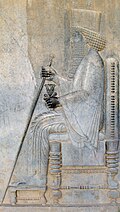Mazaeus
Mazaeus | |
|---|---|
 Possible coin of Mazaeus | |
| Native name | Mazaios |
| Born | 385 BC |
| Died | 328 BC (aged 57 years) Babylon |
| Allegiance | Achaemenid Empire,Macedonian Empire |
| Rank | Satrap ofCilicia(under theAchaemenids) Satrap ofBabylon(underAlexander the Great) |
MazaeusorMazday(Aramaic:𐡌𐡆𐡃𐡉 MZDY, Greek: ΜαζαῖοςMazaios)[1](died 328 BC) was anAchaemenidPersian noble, satrap (a type of governor) ofCiliciaand later satrap ofBabylonfor the Achaemenid Empire. He retained the satrapy after Babylon was under the rule ofAlexander the Great.[2]
Life
[edit]Mazaeus was the penultimatePersiansatrap(governor) ofCilicia.His successor in Cilicia wasArsames,who was ultimately expelled byAlexander the Great.
At theBattle of Gaugamela,Mazaeus commanded the right flank with theSyrian,Median,Mesopotamian,Parthian,Sacian,Tapurian,Hyrcanian,Sacesinian,Cappadocian,andArmeniancavalry.
As a reward for his recognition of Alexander as the legitimate successor of Darius, Mazaeus was rewarded by being able to retain the satrapy of Babylon, as a Hellenistic satrap.[2]Alexander left a Macedonian,Apollodorus of Amphipolis,as the military commander of the garrison of Babylon, and another as tax-collector.[2]Mazaeus continued minting coins under his name, and later without his name.
The daughter of the Persian king Darius III,Stateira II,was originally betrothed to him, but he died before they could be married. She was eventually married to Alexander.
Waldemar Heckel suggested that theAlexander Sarcophagusmight have been dedicated to him.[3]
Mazaeus was replaced as satrap of Babylon byStamenes.[4]
Coinage
[edit]Mazaeus had an abundant coinage, which he minted inTarsos,SidonandBabylon. Coinage as Satrap of Cilicia
-
Mazday (Mazaios) as ruler ofSidon.Circa 353-333 BC.
Coinage as Satrap of Babylon
-
Coinage of Mazaios as Hellenistic Satrap of Babylon, circa 331-328 BC.
-
Late coinage of Mazaeus as satrap ofBabylon.
References
[edit]- ^Metcalf, William (2012).The Oxford Handbook of Greek and Roman Coinage.Oxford University Press USA.ISBN978-0-19-530574-6.
- ^abcO'Brien, J. M. (2003).Alexander the Great: The Invisible Enemy: A Biography.Routledge. p. 94.ISBN9781134845019.
- ^Heckel, Waldemar (2006). "Mazaeus, Callisthenes and the Alexander Sarcophagus".Historia.55(4): 385–396.doi:10.25162/historia-2006-0025.
- ^Roisman, Joseph (2002).Brill's Companion to Alexander the Great.BRILL. p. 189.ISBN9789004217553.







